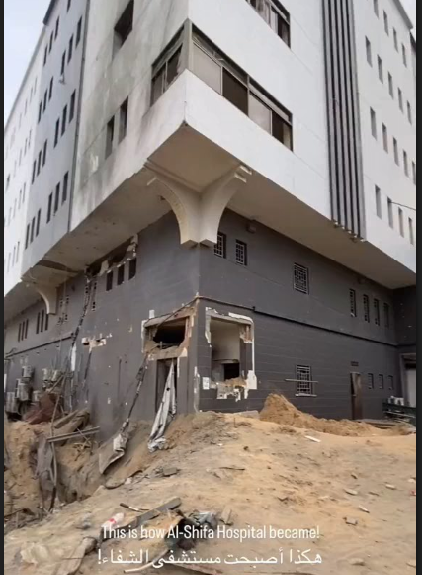A Night Without Safety
Told to me by my friend, a mental health doctor in Gaza
I remember one late evening, sitting with my friend — a mental health doctor working with emergency psychological response teams in Gaza. He lit a cigarette, took a deep breath, and said:
“Let me tell you about one of the hardest cases I’ve seen this war… His name — well, let’s just call him M.M. He’s 66, hard of hearing, a husband, and father to a single son. He used to live in Al-Rimal before his home was completely destroyed. Now, he lives in a tent near Al-Shifa Hospital.”
He paused, his eyes heavy with the weight of the story, then continued:
“It was during one of those long, merciless nights. M.M was at home with his wife and son, thinking the concrete walls might protect them. Suddenly, a tank — yes, a tank — crashed through their garden wall. Can you imagine that? A tank in your yard? Everything changed in seconds.
They were trapped for eight days, with barely enough food or water. Then a drone appeared overhead, broadcasting: ‘Don’t move’ through a speaker. Minutes later, the house was full of soldiers. Screaming. Guns pointed everywhere.
They beat him. Tied him up. He stayed bound for 12 hours. Twelve. Motionless. Deaf, terrified, humiliated. He told me: ‘I couldn’t even think straight… I forgot about my son and wife. I just cried… a lot.’
At one point, the soldiers fired randomly inside the room. Then — and this still haunts him — they made the detainees walk over the bodies of the dead. ‘We walked on corpses,’ he said, ‘blood everywhere… every step felt like dying.’
And they stole everything. His phone, ID, money. Later, the house was demolished. Everything — memories, furniture, clothes. Gone.”
My friend stopped speaking for a moment. The silence between us was louder than the story.
Then he said:
“M.M tried to plead with them — told them he used to work in Israel, that he was no threat. One soldier laughed in his face: ‘You’re all animals.’ Then they pointed a gun at him, the red laser dot shining on his forehead. ‘That’s when I thought it was over,’ he told me. ‘I recited my final prayer. I thought it was my last moment.’
When we found him, weeks later, he was hollow. A shell of a man. We gave him immediate psychological first aid — just listened, really. Let him cry. Let him be human again.”
I asked my friend how M.M is doing now.
He just shook his head.
“He lost everything: his home, his sense of safety, his dignity. He’s isolated, withdrawn, drowning in guilt and helplessness. His symptoms match PTSD, but really… it’s more than that. It’s living inside a memory of horror, with no escape.”
A Night Without Safety



Leave a Reply